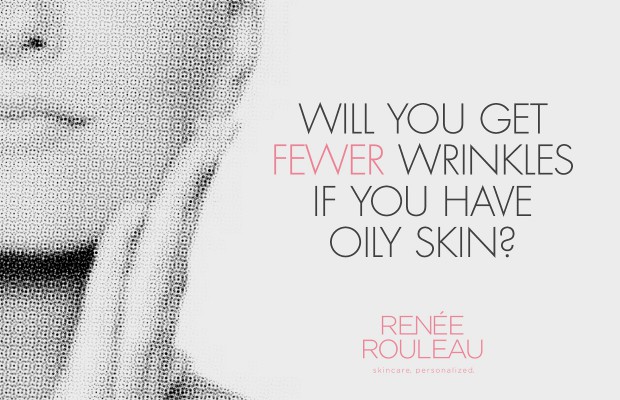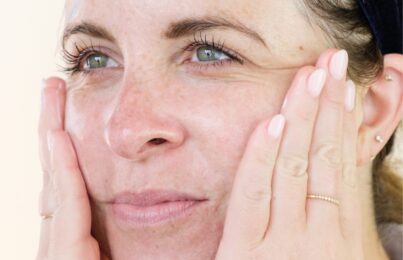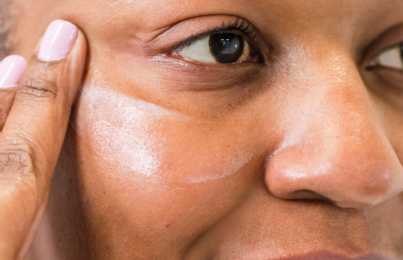Updated 1/4/18. A common assumption that I hear a lot from my oily skin clients is the assumption that they will get fewer wrinkles. People think that the upside of having to deal with managing the oil on their skin for so many years is that they will age better since they have their own moisturizer built right in. Is it true that oily skin types might actually get fewer wrinkles than those with dry skin? In this post, I’ll give my expert opinion as someone who is an esthetician and has been working on faces for the past 30+ years.
The short answer is…maybe but it’s not because of the oil. While oily skins WILL age differently than someone with dry skin, one does not necessarily have an advantage over the other.
Oily skin types tend to have thicker (due to genetics) which means they will have less of the fine “crinkly” lines under their eyes. This is because they have more natural padding (from fat cells) in the face which provides a nice cushion to prevent the skin from caving in when lines and wrinkles start to form. However, since the skin is thicker and therefore heavier, they will have deeper lines and more loss of tone. In addition, they will have larger pores than someone with dry skin due to the output of oil that occurred for many that stretched the pore opening make them enlarged.
The downside of having larger pores is that it doesn’t allow the skin to look as smooth as someone with tiny pores, and smooth skin is one of the signs attributed to youthful-looking skin. Unfortunately, with age, pores can get even larger in their appearance. Why? In the younger years when the skin is firm, large pores won’t be very noticeable due to the tightness of the skin from having a strong support of collagen and elasticity. Due to gravity and the weakening of the elastin fibers that come with age, the skin will start to drop and is no longer pulled back as tightly so the pores appear larger because they indent further into the skin. Recommended product: Pore + Wrinkle Perfecting Serum
Dry skin types, on the other hand, will have thinner skin and show finer, superficial lines along with visible broken capillaries. Thinner skins are missing some of that cushion under the skin that gives it a plumper look. However, their texture will be smoother because their pores will be smaller due to less oil secretion.
So, which type of skin ages the best? In my professional opinion as an esthetician, the person who ages the best from genetics is someone who produces some oil, but not too much. This is classified as a “normal” skin type like skin type #6. They have fairly small pores with some t-zone oil production, but the skin isn’t too dry since dry skin can look dull without light reflection due to cracks in the moisture barrier. Crinkly, crepiness occurs with dry, thin skins. A normal skin is someone who isn’t too oily so they don’t have the issue of the appearance of large pores as well as deeper lines associated with thicker, oily skins. The one that ages best is not one extreme or the other but taking the best of both skin types. Speaking of genetics, it’s important to know that this only plays a small part (about 30%) in how someone’s skin will visibly age. 70% is about using consistently caring for your skin by using the right products, daily sunscreen, and choosing healthy lifestyle choices. Trust me, you have a HUGE say in the matter as to how your skin will age. Just be sure not to fall for one of these 35 common skincare myths.
Then, of course, there are three facial features that will guarantee you’ll look younger. I feel lucky to have two out of three of these genetic characteristics. (Thanks, Mom and Dad!)
Do oily skins need a moisturizer? Absolutely. They just need one that is lightweight and oil-free. Not applying moisturizer will cause the skin to get dehydrated which is never a good option for the skin. Dehydration will cause the skin to be less light reflective due to superficial cracks in the moisturizer barrier as well as increased oil production which can possibly lead to increased breakouts since oil breeds bacteria and bacteria leads to breakouts. Moisturizing will make the skin age in a visibly more healthy way. Your skin cells are like fish and they need water to live so always use a moisturizer.
Note: There’s a difference between dry skin and dehydrated skin.
If you’re prone to having oily skin, you also more than likely have dealt with breakouts whereas dry skin types will be less susceptible to this. The good news is that there is an upside to having acne.
Which skin care products are best for you? See our nine skin types or take the Skin Type Quiz and get products recommended.
Need expert advice from a licensed esthetician? Schedule a virtual consultation to get customized advice in person, over the phone or online via Skype or FaceTime.
For more expert advice check out the blog. Also, sign up for our skin tip e-newsletter, follow Renée Rouleau on Twitter and Instagram and join the discussion on our Facebook page. You’ll be your own skin care expert in no time. Get the #ReneeRouleauGlow!
Celebrity Esthetician & Skincare Expert
As an esthetician trained in cosmetic chemistry, Renée Rouleau has spent 35 years researching skin, educating her audience, and building an award-winning line of products. Her hands-on experience as an esthetician and trusted skin care expert has created a real-world solution — products that are formulated for nine different types of skin so your face will get exactly what it needs to look and feel its best. Trusted by celebrities, editors, bloggers, and skincare obsessives around the globe, her vast real-world knowledge and constant research are why Marie Claire calls her “the most passionate skin practitioner we know.”



